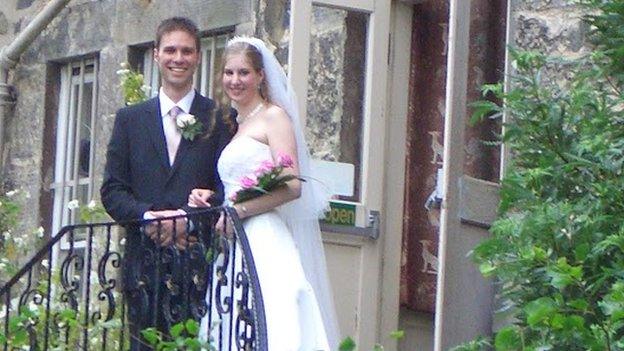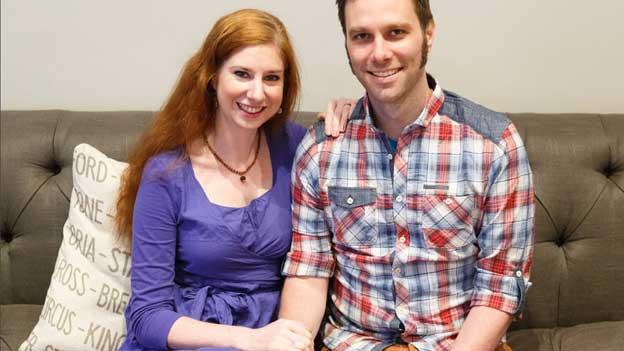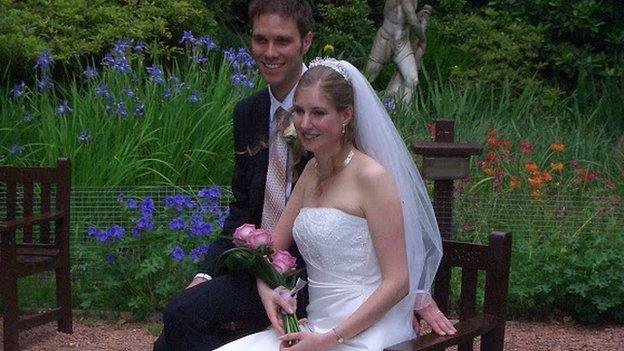Scottish humanists to overtake Kirk weddings
- Published

Karen Watts & Martin Reijns were the first couple to have a legal humanist wedding in Scotland
Humanist weddings, which were first held exactly a decade ago, could be Scotland's most popular type of belief ceremony by the end of the year.
Gordon MacRae, of the Humanist Society Scotland, said humanist weddings - not legally binding in England and Wales - were a "great Scottish success story".
He estimates there will be 4,200 humanist weddings this year, more than Church of Scotland ceremonies.
The Kirk said it was not convinced the figures were correct.
It said weddings in the Christian faith, including Roman Catholic and other denominations, were still well ahead of humanist weddings.
About half of all weddings in Scotland are civil ceremonies carried out by an official registrar. The others are classed as religious or belief ceremonies.
Religious marriages in Scotland were never restricted by location, unlike civil ceremonies which were always in a register office before a 2002 change allowed other "approved places".
In 2005 the Registrar General for Scotland decided, after considering the European Convention on Human Rights, to allow humanists to conduct weddings as "authorised celebrants" - giving them equal status with ministers of religion.
Karen Watts and Martin Reijns were the first couple in Scotland to be married by a humanist celebrant, external, when they tied the knot at Edinburgh Zoo on 18 June 2005.

Karen and Martin, who have now been married 10 years, said a humanist wedding was the "obvious choice" for them
Ms Watts said the pair would not have been comfortable with a religious ceremony and a civil registration seemed a "bit cold".
She said at the time: "Neither of us are religious and it would have felt hypocritical to get married in a church.
"But at the same time we wanted something more meaningful than the legal civil ceremony."
Mr MacRae, chief executive of the Humanist Society Scotland (HSS), said its ceremonies allowed people to celebrate in a way that suited them, free from religious dogma.
He said humanism was a "rational, ethical and democratic approach to life" and that was put "front-and-centre" in its approach to marriage.
Mr MacRae said the change in the rules on belief weddings were a "great Scottish success story".
"It is shocking discrimination against humanists elsewhere in the United Kingdom that they are denied that outside of Scotland," he said.
The last year for which the National Records of Scotland published full figures on marriage, external was 2013.
In that year there were 3,185 humanist ceremonies, a massive increase on the 82 in 2005.
Humanist ceremonies overtook Roman Catholic weddings in number in 2010 and if the Church of Scotland has continued the steady decline of the past decade it could conduct fewer weddings this year than the humanist society.
In 2013 the Church of Scotland conducted 4,616, down from more than 10,000 a decade earlier.
Mr MacRae said: "At this rate we would anticipate being the largest provider of legal weddings of any of the religious or belief groups within Scotland by the end of the year."
The Church of Scotland's Acting Principal Clerk George Whyte questioned the figures but said the Kirk was not in the habit of competing for business.
The Reverend Dr Whyte said: "We are not selling ourselves as an exercise in earning money from people's weddings."
He said the HSS would charge £390 for a wedding celebrant plus the cost of becoming a member of the society.
"They offer a service people can buy and perhaps feel in the buying of a service they can tailor it in ways they want," Dr Whyte said.
"Perhaps that is more in tune with our consumerist society."
Dr Whyte said Kirk ministers were forbidden from charging a fee although the Church asked for payment for the use of its buildings.
He said: "We are not in competition but we are more than happy to discuss all sizes and locations of weddings and can be very flexible about the services we offer. Maybe we should have been shouting about that more loudly."
- Published18 June 2015

- Published20 February 2011